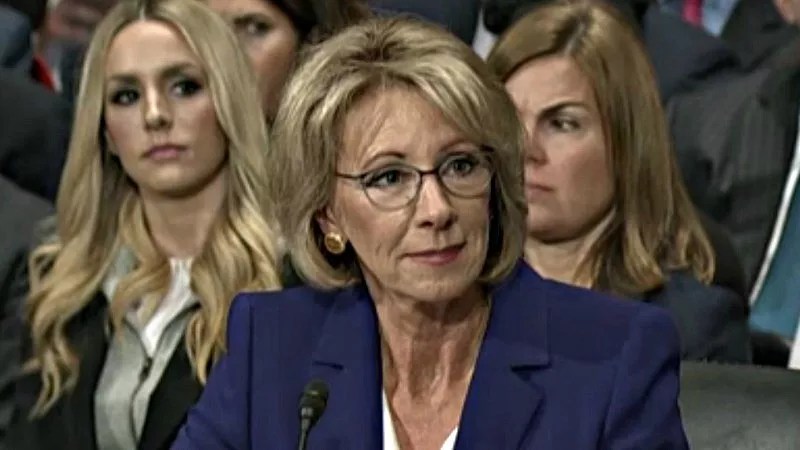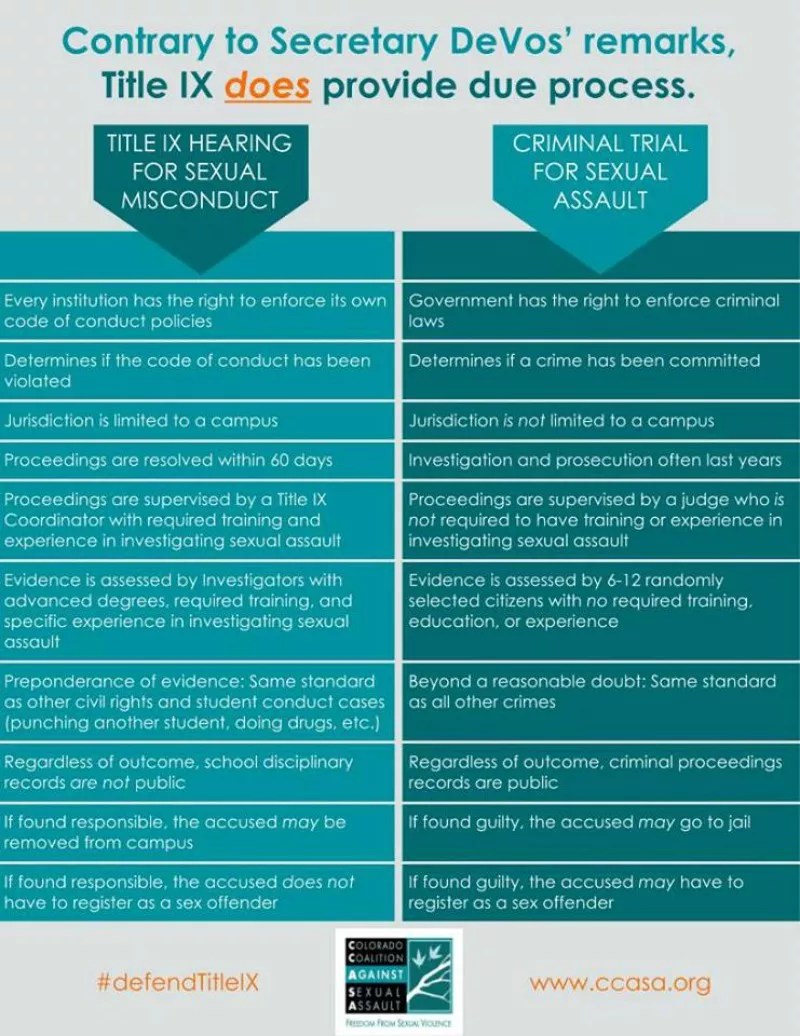
Thinkstock file photo

Audio By Carbonatix
Controversial Department of Education Secretary Betsy DeVos has called for sweeping changes in how sexual-assault accusations are handled on college campuses. Now, against the backdrop of numerous lawsuits filed against universities in Colorado on behalf of men accused in such cases, who maintain that the process treats them unfairly, a group of officials, including many affiliated with colleges in the state, have combined forces to argue in favor of a more thoughtful approach to the issue.
“We shouldn’t throw the baby out with the bathwater,” says Sarah J. Berg, Deputy Title IX Coordinator of Prevention, Training and Outreach for the University of Colorado Denver and the Anschutz Medical Campus. “There’s still room for improvement, but that doesn’t mean we should completely trash everything and start over.”
Berg is a member of the Denver Title IX Working Group affiliated with the Sexual Assault Interagency Council, which “is comprised of Title IX folks from almost all the schools in Denver,” she says, “as well as representatives of the Denver Police Department, folks from the district attorney’s office, and folks from some of our community partners.” The Colorado Coalition Against Sexual Assault has been a guest at some of the group’s meetings, too.
Together, these parties have assembled a letter, accessible below, that responds to a September 7 speech given by DeVos at George Mason University in which she lambasted the current system of investigating sexual-assault claims at U.S. colleges and invited the public to comment on the topic. Problem is, the public-comment period ends at 11:59 p.m. on September 20, less than two weeks after DeVos’s remarks. Berg concedes that although the web link for public comments, shared at the bottom of this post, has been online since June, “I don’t know anyone who’d heard about it” before DeVos’s GMU speech earlier this month.
The Denver Title IX Working Group letter is intended to “debunk some of the myths Secretary DeVos forwarded in her narrative,” Berg points out, “and one of the big ones that comes up is her allegation that folks doing this work on campuses have no training in adjudicating sexual problems on campus.”

Betsy DeVos, who currently heads the Department of Education.
YouTube file photo
In Berg’s view, this charge had more credibility prior to 2011, when the Department of Education under President Barack Obama issued guidelines for handling such matters in what’s popularly known as the “Dear Colleague” letter. Back then, she acknowledges, “a lot of folks doing Title IX work might not have had great training or weren’t able to be dedicated to the work full-time. But the process has improved dramatically since then, including ours at CU Denver and the Anschutz Medical Campus.”
As such, Berg argues that “a lot of [DeVos’s] comments reference a time of the past and aren’t accurate today” – an assertion reinforced in a point-by-point refutation published in the Chronicle of Higher Education. She notes that Scott D. Schneider, the author of that piece, “looked up a lot of the cases she mentioned and showed that they were from back before 2011, when the policies had improved for a lot of schools.”
DeVos also suggested “taking Title IX investigations away from schools and putting them back in the hands of law enforcement – as if only law enforcement is capable of looking into these situations,” Berg goes on. “But as school administrators, there are things we can do for both parties” – accusers and the accused – “that aren’t in the purview of law enforcement. We’re really thinking about access to education and keeping folks successful and safe by maybe helping them drop a class after something has happened, because they can no longer concentrate, or getting them moved to a different dorm so they’ll no longer see the other person.”
Berg stresses that “education is at the heart of what Title IX is about, and if you take that away from schools and give it to law enforcement, then folks will have to go to law enforcement to get anything done – and we know most survivors in sexual assault don’t report to police.” She fears that making such a switch “would result in discouraging folks from reporting.”
Another topic cited by DeVos in her speech was what Berg calls “the threshold for school investigations, and the idea that it’s too low in Title IX investigations, where we use the ‘preponderance of the evidence’ standard. That’s different from criminal court,” which requires “clear and convincing evidence,” but “it’s the same standard used in civil court.”
Other arguments along due-process lines are sketched out in the following graphic assembled by the Colorado Coalition Against Sexual Assault:

Colorado Coalition Against Sexual Assault
Attorney Andrew Miltenberg is another critic of current campus sexual assault policies, as he’s made clear in recent filings against the University of Denver and the Colorado School of Mines; the latter involved a threesome on video. In this space, he’s highlighted complaints about what he terms “the single investigator model, which allows one individual to conduct the entire investigation, make a determination of responsibility and issue a corresponding finding – which a respondent has no right to appeal. The university’s code does not provide for a hearing on the charges, and the respondent is denied an opportunity to confront his accuser, question any witnesses against him and present his defense before an impartial decision maker.”

Sarah J. Berg, Deputy Title IX Coordinator of Prevention, Training and Outreach for the University of Colorado Denver and the Anschutz Medical Campus.
Far from dismissing Miltenberg’s take, Berg endorses it under certain circumstances. “I would venture to say a duel-investigator model would be great if schools could adequately staff that many folks, because there’s more of an opportunity to have work double-checked without making anyone repeat their story over and over again. At CU Boulder, they do that: They have two investigators assigned to every case. One takes the lead, but the other is there for support and to be able to say, ‘Let’s think about that conclusion.’ And even though we have the single-investigator model at CU Denver, because we have a smaller staff, there’s still a group to review the report to check for gaps and bias.”
Other reform proposals have come from organizations such as the American Bar Association, whose Task Force on Campus Sexual Misconduct was highlighted in a National Public Radio report aired this morning. The ABA group recommends a standard that occupies a middle ground between “preponderance of the evidence” and “clear and convincing evidence” and proposes “that both parties have a right to appeal. The grounds for appeal should be limited to (1) new information not known or available at the time of the hearing; (2) procedural error that materially affected the findings of fact (this includes improperly excluding or including evidence); (3) the imposition of a sanction disproportionate to the findings in the case (that is, too lenient or too severe); or (4) the conduct as found by the decision-maker does not violate school policy (this is not intended to allow an appeal for new fact-finding).”
It’s unclear whether these suggestions will get a hearing from DeVos, given the barbs during her speech aimed at “kangaroo courts.” But Berg encourages the public to weigh in against simply ditching the current policy. In her words, “I believe in this process, and I believe in the work of my colleagues.”
Here’s the link to publicly comment on proposed changes in campus sexual-assault investigations through September 20. Click to read the complete Denver Title IX Working Group Response to Betsy DeVos.